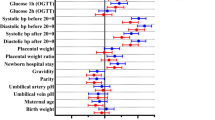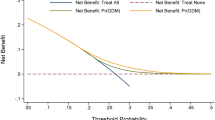Abstract
Objective:
To determine the relationship between maternal ABO blood group and risk of adverse pregnancy outcomes.
Study Design:
Data on ABO phenotypes and pregnancy outcomes were collected from medical records of 5320 singleton pregnant women who had ABO blood testing and follow-up care until delivery in our institution. Adverse pregnancy outcomes that were studied in relation to maternal blood group included preeclampsia, gestational diabetes mellitus (GDM), preterm delivery, low birth weight (LBW) and small for gestational age (SGA) infants.
Result:
Out of 5320 women, 350 (6.6%), 333 (6.3%) and 543 (10.2%) women were diagnosed with preeclampsia, GDM and preterm delivery, respectively. LBW and SGA were, respectively, observed in 394 (7.4%) and 178 (3.3%) infants. By uni- and multivariable analyses, women with A or AB blood types, but not B, were found at increased risk of preeclampsia compared with O type individuals; adjusted relative risks were 1.7 (95% confidence interval (CI), 1.3 to 2.3; P=0.001) for A phenotype and 1.7 (95% CI, 1.1 to 2.6; P=0.01) for AB phenotype. There were no significant relationships between blood types and GDM, preterm delivery, LBW or SGA.
Conclusion:
Maternal ABO blood group was associated with the risk of preeclampsia, but not with GDM, preterm delivery, LBW or SGA.
This is a preview of subscription content, access via your institution
Access options
Subscribe to this journal
Receive 12 print issues and online access
$259.00 per year
only $21.58 per issue
Buy this article
- Purchase on Springer Link
- Instant access to full article PDF
Prices may be subject to local taxes which are calculated during checkout
Similar content being viewed by others
References
Storry JR, Olsson ML . The ABO blood group system revisited: a review and update. Immunohematology 2009; 25: 48–59.
Storry JR . Human blood groups: inheritance and importance in transfusion medicine. J Infus Nurs 2003; 26: 367–372.
Reid ME, Mohandas N . Red blood cell blood group antigens: structure and function. Semin Hematol 2004; 41: 93–117.
Yip SP . Single-tube multiplex PCR-SSCP analysis distinguishes 7 common ABO alleles and readily identifies new alleles. Blood 2000; 95: 1487–1492.
Oriol R, Candelier JJ, Mollicone R . Molecular genetics of H. Vox Sang 2000; 78 (Suppl 2): 105–108.
Garratty G . Blood groups and disease: a historical perspective. Transfus Med Rev 2000; 14: 291–301.
Smith AW, Aathithan S, Power EG, Abdulla Y . Blood group antigens and Helicobacter pylori infections. Lancet 1994; 343: 543.
O’Donnell J, Laffan MA . The relationship between ABO histo-blood group, factor VIII and von Willebrand factor. Transfus Med 2001; 11: 343–351.
Aird I, Bentall HH, Roberts JA . A relationship between cancer of the stomach and the ABO blood groups. Br Med J 1953; 1: 799–801.
Melzer D, Perry JR, Hernandez D, Corsi AM, Stevens K, Rafferty I et al. A genome-wide association study identifies protein quantitative trait loci (pQTLs). PLoS Genet 2008; 4: e1000072.
Paré G, Chasman DI, Kellogg M, Zee RY, Rifai N, Badola S et al. Novel association of ABO histo-blood group antigen with soluble ICAM-1: results of a genome-wide association study of 6578 women. PLoS Genet 2008; 4: e1000118.
Hiltunen LM, Laivuori H, Rautanen A, Kaaja R, Kere J, Krusius T et al. Blood group AB and factor V Leiden as risk factors for pre-eclampsia: a population-based nested case-control study. Thromb Res 2009; 124: 167–173.
May D . Letter: maternal blood group A and pre-eclampsia. Br Med J 1973; 4: 738.
Spinillo A, Capuzzo E, Baltaro F, Piazzi G, Iasci A . Case-control study of maternal blood group and severe pre-eclampsia. J Hum Hypertens 1995; 9: 623–625.
Clark P, Walker ID, Govan L, Wu O, Greer IA . The GOAL study: a prospective examination of the impact of factor V Leiden and ABO(H) blood groups on haemorrhagic and thrombotic pregnancy outcomes. Br J Haematol 2008; 140: 236–240.
Donma MM . Macrosomia, top of the iceberg: the charm of underlying factors. Pediatr Int 2011; 53: 78–84.
American College of Obstetricians and Gynecologists Committee on Practice Bulletins—Obstetrics. ACOG practice bulletin: diagnosis and management of preeclampsia and eclampsia: number 33, January 2002. Obstet Gynecol 2002; 99: 159–167.
American Diabetes Association. Gestational diabetes mellitus. Diabetes Care 2004; 27 (Suppl 1): S88–S90.
Thaithamyanont P, Bhongvej S, Chittinond S . Intrauterine growth in Thai population. J Pediatr Soc Thai 1984; 23: 99–105.
Racial & ethnic distribution of ABO blood types. Available at: http://www.bloodbook.com/world-abo.html, Retrieved 9 February 2012.
Wiwanitkit V . ABO blood group of the Thais in Bangkok. Songkla Med J 2001; 19: 9–12.
Jenkins PV, O’Donnell JS . ABO blood group determines plasma von Willebrand factor levels: a biological function after all? Tranfusion 2006; 46: 1836–1844.
Nadar SK, Al Yemeni E, Blann AD, Lip GY . Thrombomodulin, von Willebrand factor and E-selectin as plasma markers of endothelial damage/dysfunction and activation in pregnancy induced hypertension. Thromb Res 2004; 113: 123–128.
Parra-Cordero M, Bosco C, González J, Gutiérrez R, Barja P, Rodrigo R . Immunohistochemical expression of von Willebrand factor in the preeclamptic placenta. J Mol Histol 2011; 42: 459–465.
Deng L, Bremme K, Hansson LO, Blombäck M . Plasma levels of von Willebrand factor and fibronectin as markers of persisting endothelial damage in preeclampsia. Obstet Gynecol 1994; 84: 941–945.
Qi L, Cornelis MC, Kraft P, Jensen M, van Dam RM, Sun Q et al. Genetic variants in ABO blood group region, plasma soluble E-selectin levels and risk of type 2 diabetes. Hum Mol Genet 2010; 19: 1856–1862.
Vitoratos N, Economou E, Iavazzo C, Panoulis K, Creatsas G . Maternal serum levels of TNF-alpha and IL-6 long after delivery in preeclamptic and normotensive pregnant women. Mediators Inflamm 2010; 2010: 908649.
Szarka A, Rigó Jr J, Lázár L, Beko G, Molvarec A . Circulating cytokines, chemokines and adhesion molecules in normal pregnancy and preeclampsia determined by multiplex suspension array. BMC Immunol 2010; 11: 59.
Chavarría ME, Lara-González L, García-Paleta Y, Vital-Reyes VS, Reyes A . Adhesion molecules changes at 20 gestation weeks in pregnancies complicated by preeclampsia. Eur J Obstet Gynecol Reprod Biol 2008; 137: 157–164.
Puangsricharern A, Suksawat S . Prevalence of Rh negative pregnant women who attended the antenatal clinic and delivered in Rajavithi Hospital: 2000-2005. J Med Assoc Thai 2007; 90: 1491–1494.
Author information
Authors and Affiliations
Corresponding author
Ethics declarations
Competing interests
The authors declare no conflict of interest.
Rights and permissions
About this article
Cite this article
Phaloprakarn, C., Tangjitgamol, S. Maternal ABO blood group and adverse pregnancy outcomes. J Perinatol 33, 107–111 (2013). https://doi.org/10.1038/jp.2012.73
Received:
Revised:
Accepted:
Published:
Issue Date:
DOI: https://doi.org/10.1038/jp.2012.73
Keywords
This article is cited by
-
Genes, exposures, and interactions on preterm birth risk: an exploratory study in an Argentine population
Journal of Community Genetics (2022)
-
Maternal ABO blood group and adverse pregnancy outcomes in Japanese population
Journal of Perinatology (2013)
-
Reply to Drs Hiraizumi and Suzuki
Journal of Perinatology (2013)



